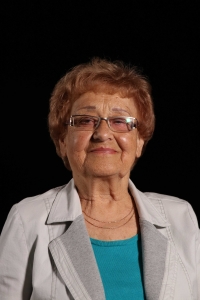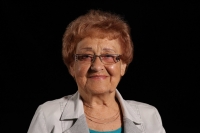When my husband and I wanted to say something private, we went to the Kampa park

Stáhnout obrázek
Daniela Štěpánová, née Lindová, was born on July 31, 1934 in Korycany in the Mělník region to the family of farmers Richard and Vlasta Lindová. She grew up with two younger sisters. In 1937, her parents rented a farm in Hoštka. After the Nazi occupation of the Sudetenland, Hoštka became a part of the Third Reich, the Czech school was abolished by the Germans and Daniela attended a German school. They could travel to the protectorate to visit their grandparents on a pass. Richard Linda employed only Czechs and Slovaks on the farm. In 1948, the Communists nationalized the farm, Richard Linda was employed as the director, but after two years he was unjustifiably dismissed and allowed to work only as a feeder for the masons. The family had to move out. Daniela completed her basic education in 1949 and, as the daughter of a „kulak“, was not entitled to further education. She went to Prague to try her luck, where she got into a social law school, but after a year she had to leave for political reasons. She got into the field of dental laboratory, which she graduated from and wanted to continue at university, but again this was not possible for political reasons. In 1955, she got married and started a family. They lived in Prague. She was at home with the children for the next 16 years. She and her husband planted an apricot orchard, to which they devoted every free time for another 40 years, and then had additional income from the sale of apricots. In August 1968, the sister of the witness Vladka emigrated. The Štěpáns also experienced house searches and the fear of wiretapping when they were to travel to Switzerland at the invitation of their brother-in-law. Since the beginning of the 1970s, Daniela Štěpánová worked in a construction company in the Safety and Health Protection Department, which was located on Národní třída, where the Velvet Revolution also took place. Daniela Štěpánová managed the apricot orchard for six years after her husband‘s death. Around 2000, she sold it and started traveling the world.

